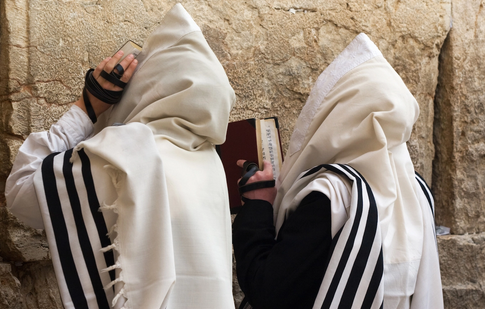The Month of Tevet: Anger, Ayin Hara, and the Power of Ayin Tov
The Hebrew month of Tevet presents a profound opportunity for spiritual growth.
Beginning with the lingering light of Hanukkah and including the fast of Asara B’Tevet, this month holds both challenges and immense potential.
Asara B’Tevet, the 10th of Tevet, commemorates the siege of Jerusalem and the events leading to the destruction of the First and Second Temples. According to the prophet Zechariah, these fasts will one day transform into “days of joy and gladness” in the era of Moshiach. Tevet is also woven into the narrative of Purim, as it marks Esther’s introduction to King Achashverosh, laying the groundwork for the Jewish people’s eventual salvation.
A Month of Challenge and Growth
Kabbalistically, Tevet is associated with the sense of anger. The darkness of Tevet invites us to confront these psychological shadows and rectification of our anger lies at the heart of Tevet's spiritual work.
The Talmud equates anger with idolatry, as it denies faith in Hashem’s providence and order. This destructive force has the potential to distort our perception, leading us to act impulsively and harm our relationships to others and ourselves. However, it is important to note that anger is not inherently negative. When anger is directed toward injustice and tempered with divine alignment, anger can be transformed into a constructive force for change. For example:
Pinchas acted with zeal (Numbers 25:6-13) when he confronted immorality in Israel. His action is described as being "zealous for My sake" (kanai le’Elokav), and he was rewarded with Hashem’s covenant of peace.
In Berachot 5a, it discusses the importance of channeling anger toward constructive purposes, such as self-improvement or protesting injustice, provided it does not stem from personal ego or vengeance.
Moshe Rabbeinu (Moses) displayed anger in several instances, such as breaking the tablets (Exodus 32:19) after seeing the sin of the Golden Calf. The Talmud in Shabbat 87a explains that Moshe's breaking of the tablets was a righteous act intended to preserve the sanctity of the covenant and demonstrate the gravity of the sin.
However, in most cases anger is often resulting from jealousy and/or judgement. This makes anger deeply intertwined with Ayin Hara (Evil Eye) which distorts our perception and creates as well as invites negativity in our lives.
Talmud Bavli, Pesachim 113b discusses Ayin Hara and lists anger as one of the traits that harms a person spiritually and physically. It explains that anger leads to rash behavior and a loss of divine protection, making a person more susceptible to negative spiritual forces, including Ayin Hara.
The Ramban’s famous letter emphasizes the importance of avoiding anger, stating: “Through anger, a man opens the door to every destructive trait."
Orchot Tzaddikim explains that "anger leads to kinah (jealousy) and ta’arovet dinim (a mix of harsh judgments), which fuel Ayin Hara. An angry person loses control of their inner world, which diminishes their spiritual protection."
This same energy, when harnessed and refined, can be transformed into Ayin Tov (Good Eye), a perspective rooted in kindness, gratitude, and divine alignment.
The challenge lies in refining anger, ensuring that it aligns with Hashem’s will and does not stem from ego, jealousy or judgement. By channeling this energy into positive action such as prayer, we align with the divine attribute of compassion. Heaven mirrors our actions and when we align ourselves with Hashem from below, Hashem aligns with us from above.. Bringing blessings, protection and merit into our lives.
The Talmud states that "One who is not envious of others’ success and looks upon others with kindness and generosity merits divine protection."
Rabbi Ovadiah of Bartenura comments in his commentary on Pirkei Avot 2:9 on the connection between Ayin Tov and protection from harm. He explains that having a good eye is the foundation for both personal happiness and communal harmony, which inherently shields one from the destructive effects of Ayin Hara.
In Sefer HaChinuch, Mitzvah 338, Chinuch explains that "cultivating an Ayin Tov aligns a person with divine providence. This alignment makes them less vulnerable to external negativity, including the effects of Ayin Hara."
Overcoming Jealousy: Trusting in Divine Providence
Jealousy arises when we believe we lack something that another person possesses, reflecting a lack of trust in Hashem’s providence. The Torah explicitly commands us, "lo tachmod" (You shall not covet), urging us to cultivate satisfaction with our portion.
The Rambam explains that while desiring something in our hearts (lo titaveh) can seem harmless, it is a seed that can grow into coveting and taking action to acquire what does not belong to us. Tevet calls us to uproot this destructive tendency by embracing gratitude and faith in Hashem’s unique plan for each of us. This perspective reflects an Ayin Tov (Good Eye) that rejoices in the blessings of others without resentment.
Managing Judgment: Balancing Truth and Mercy
Judgment is another manifestation of Ayin Hara (Evil Eye). The Ba’al Shem Tov teaches that the faults we perceive in others often mirror our inner struggles. Instead of condemning others, we are called to see these moments as opportunities for self-reflection and growth. Self-judgment, too, must be tempered with compassion. Hashem values effort over perfection, and while introspection is vital, harsh self-criticism can lead to despair.
By aligning our judgment with divine mercy and compassion, we cultivate an Ayin Tov (Good Eye) that sees the potential for growth and goodness in all situations.
Illuminating the Darkness
The Hebrew word Tevet is derived from tov (good), hinting at the transformative potential hidden within this month. The spiritual work of Tevet—rectifying jealousy, judgment, and anger—leads us toward an Ayin Tov (Good Eye) that brings light, healing, merit and blessing into our lives and the lives of others around us.
May we use the month of Tevet to cultivate an Ayin Tov (Good Eye), to see the good in every person and situation, and to transform the challenges we face into opportunities for spiritual elevation and divine connection.




